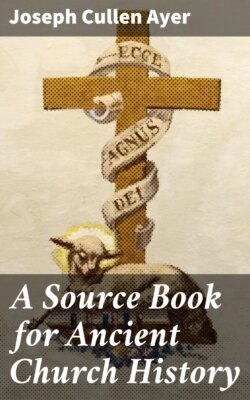Читать книгу A Source Book for Ancient Church History - Joseph Cullen Ayer - Страница 46
На сайте Литреса книга снята с продажи.
§ 15. Church Discipline
ОглавлениеTable of Contents
The Church was the company of the saints. How far, then, could the Church tolerate in its midst those who had committed serious offences against the moral law? A case had occurred in the Corinthian church about which St. Paul had [pg 043] given some instructions to the Christians of that city (cf. I Cor. 5:3–5; II Cor. 13:10). There was the idea current that sins after baptism admitted of no pardon and involved permanent exclusion from the Church (cf. Heb. 10:26). A distinction was also made as to sins whereby some were regarded as “sins unto death” and not admitting of pardon (cf. I John 5:16). In principle, the exclusion from the Church of those who had committed gross sins was recognized, but as the Church grew it soon became a serious question as to the extent to which this strict discipline could be enforced. We find, therefore, a well-defined movement toward relaxing this rigor of the law. The beginning appears in Hermas, who admits the possibility of one repentance after baptism. A special problem was presented from the first by the difference between the conceptions of marriage held by the Christians and by the heathen. The Church very early took the position that marriage in some sense was indissoluble, that so long as both parties to a marriage lived, neither could marry again, but after the death of one party the surviving spouse could remarry, although this second marriage was looked upon with some disfavor. Both the idea of a second repentance and the idea of the indissolubility of marriage are expressed in the following extract from Hermas:
